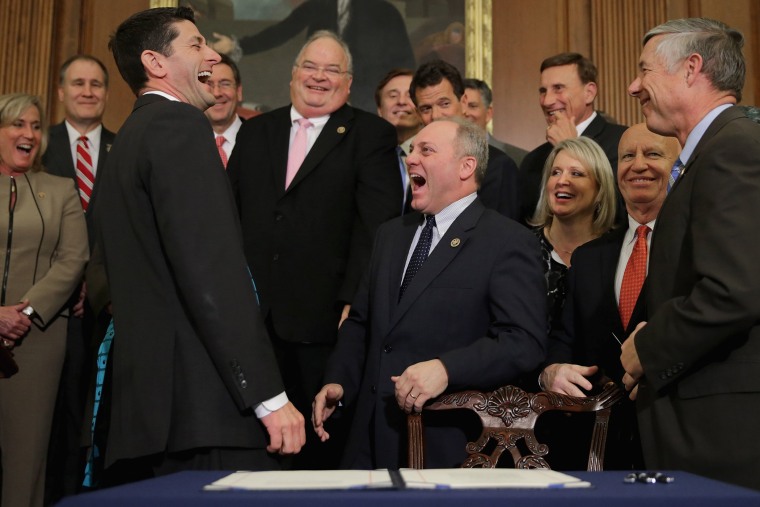In any democratic system, there's usually quite a bit of overlap between what the public wants and the priorities politicians tend to pursue. There's no great mystery here: unless elected officials intend to have short careers in politics, they have an incentive to satisfy the electorate's demands.
And yet, in contemporary politics, there's a disconnect. The public urged Republicans not to take away health care coverage from millions of Americans, and yet, GOP policymakers fought tooth and nail to do exactly that. The public then urged Republicans not to cut taxes for the wealthy and big corporations, only to have GOP policymakers again do the opposite.
The same is true when it comes to policies the American mainstream actually likes. The public wants new measures, such as expanded background checks, to prevent gun violence. The public also wants protections for Dreamers. Republicans who control the levers of power don't want either of these things, and so these goals are likely to go unmet.
The Washington Post's Catherine Rampell makes the case today that it's important to identify the nature of the problem with specificity.
Dysfunctional Washington refuses to work out its differences to solve problems that matter to Americans. So say pundits and policy activists, perhaps hoping that diffuse criticism, rather than finger-pointing, will yield a government willing to govern.But the problem isn't "Washington." It isn't "Congress," either. The problem is elected officials from a single political party: the GOP.
That seems more than fair. The next question is why Republican politicians, who ostensibly have to worry about the will of the electorate, are going in one direction while the American mainstream goes in another.
As regular readers know, there are multiple schools of thought. Some have argued that this is all about money -- GOP officials feel the need to listen to donors, not voters -- but I'm skeptical. Many of the Republicans ignoring public attitudes are likely to win re-election easily and already have full campaign coffers. Much of the time, their political agenda is driven by a sincere far-right ideology, not the demands of contributors.
Others have made the case that Republicans no longer care what voters think because they believe they've successfully shielded themselves from public attitudes through gerrymandering and voter-suppression techniques. By this reasoning, GOP officials work from the assumption that they'll win elections, en masse, whether voters approve of their records or not. They can do as they please because, in their minds, the consent of the governed is now little more than an annoying, irrelevant detail.
But The Atlantic's Ron Brownstein went a step further yesterday, explaining that Republicans' beliefs may be at odds with most voters, but they're very much in line with their voters.
Republicans represent what I've called a "coalition of restoration" centered on the older, blue-collar, evangelical, and non-urban whites most uneasy about the tectonic cultural and economic forces reshaping American life. That means that compared with the nation overall, most Republicans are representing areas with more guns and fewer immigrants.Forty-two of the 51 Republican senators, for instance, were elected from one of the 30 states where immigrants represent the smallest share of the population, according to Census data. Republicans hold just nine of the 40 Senate seats in the 20 states with the highest immigrant-population share. Likewise, 26 of the states Trump carried in 2016 were among the 30 lowest in immigration-population share; he won just four of the top 20.Continuing the pattern, over four-fifths of House Republicans represent districts where the immigrant share of the population lags the national average. But, conversely, gun ownership is much more common among Republican-leaning constituencies and communities than in the nation overall.
It's effectively an awkward numbers game: the nation's urban centers tend to have growing populations, and those Americans' attitudes help reflect the nation's political mainstream, but this doesn't change the right's structural advantage in Congress, tilting the playing field toward interests that are more rural, whiter, and older.
